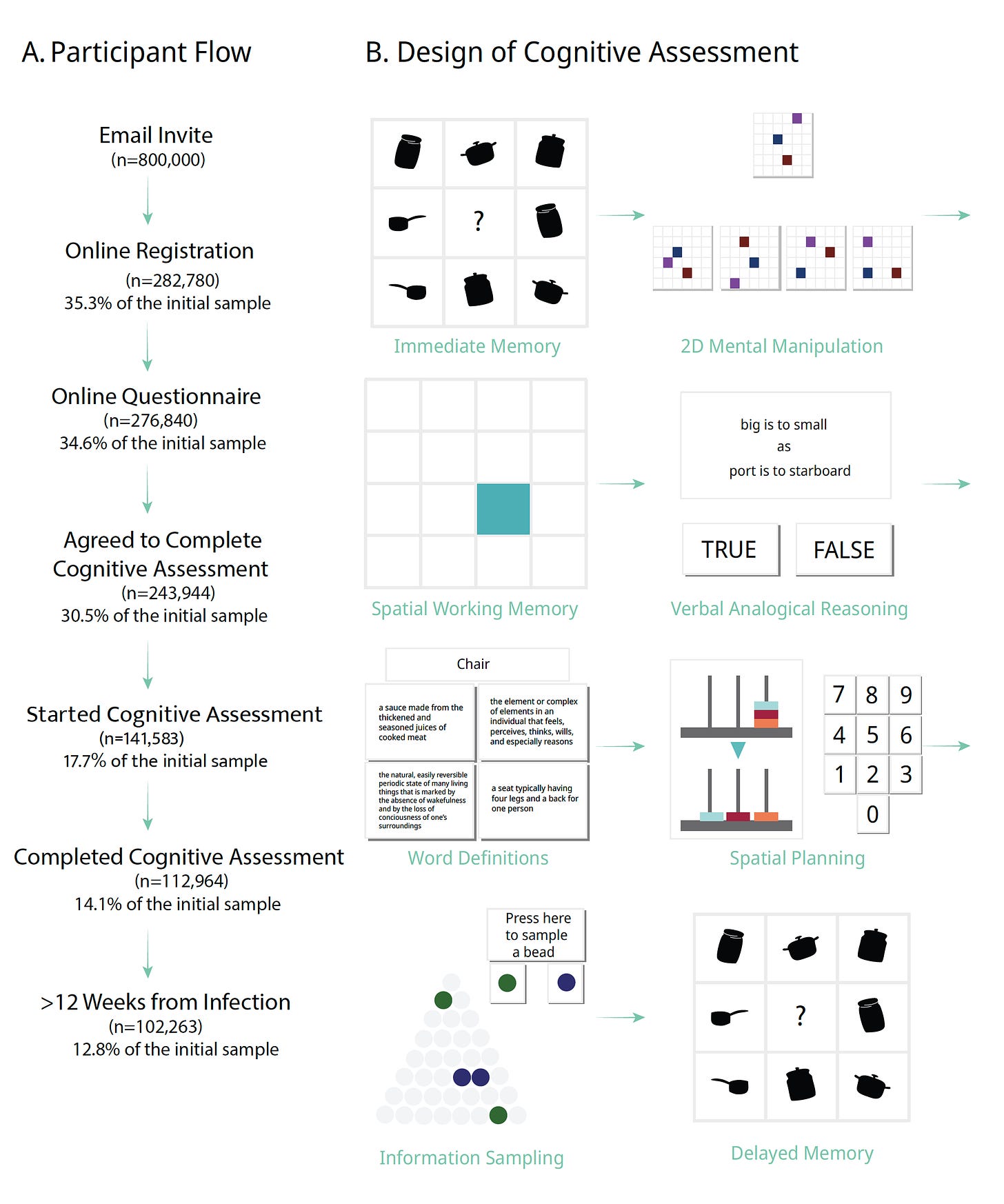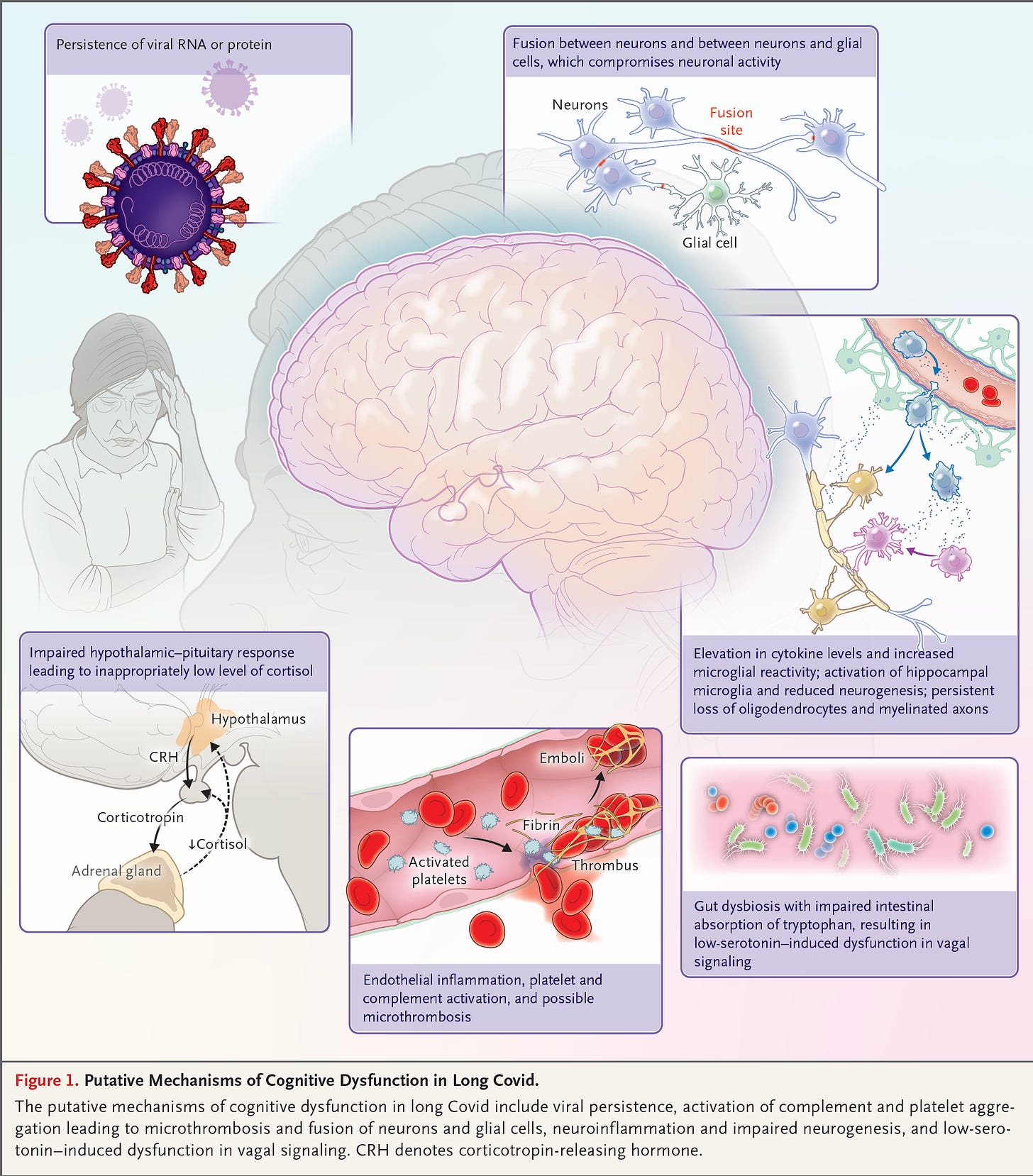Long Covid and Cognitive Deficits
What we're learning from 2 new, large population prospective assessments
Two new studies published in the New England Journal of Medicine today address the extent and duration of cognitive deficits after Covid in very large cohorts.
The First Study
In England, in a prospective study nearly 113,000 participants, with or without Covid infections, accepted the invitation to participate and completed a cognitive and memory assessment (see flow chart below from the 800,000 total community of participants) and after 12 weeks, with or without symptom resolution. The cognitive 8-domain assessment (right side of panel below) demonstrated that the impact of Covid was mainly seen on memory, executive function and reasoning. The adverse cognitive impact was worst with the original (ancestral) virus and the Alpha variant, compared with subsequent Delta and Omicron variants, and there was some protective effect of vaccination.
Extrapolation to Loss of IQ points, compared to uninfected controls:
Mild Covid, Resolved Symptoms: 3 points
Unresolved Symptoms: 6 points
Covid requiring Intensive Care Unit admission: 9 points
Reinfection: Additional 2 points
The graph below shows the cognitive decline metric at different time points, for the different variants, with or without symptom resolution.
The graph below presents details of the test scores for memory and brain fog by 3 groups—no Covid, symptoms resolved, and >12 weeks of symptomatic Covid (i.e. Long Covid)
The Second Study
In Norway, over 134,000 participants in a nationwide study (of ~188,000 total) with Covid tests completed a 13-item memory questionnaire (EMQ, range of score 1-52 points) at baseline, pre-Covid, and subsequently at several points up to 3 years. The analysis was adjusted for age, vaccination status, co-existing conditions, and many known potential confounding characteristics. About half of the near 112,000 participants with Covid tests were either positive or negative. Before Covid, their baseline scores were the same, but as you can see in the graph below there was significant decline (point estimates with 95% confidence intervals are the vertical bars) in the participants at every time point assessed in those who tested positive for Covid during extended follow-up.
Both studies have the limitation of ascertainment bias—participants who enrolled and were willing to do the assessments, as compared with those who did not for reasons such as being too sick.
An accompanying editorial by Ziyad Al-Aly and Clifford Rosen provided important context, citing the US Population Survey with more than 1 million Americans reporting having “serious difficulty” remembering, concentrating, or making decisions than any time in the preceding years. The graphic accompanying their editorial, reviewing the different mechanisms that appear to be underpinning brain involvement from Covid, is excellent. This important topic was just reviewed by Michelle Monje in the Ground Truths podcast, as she highlighted the role of microglia activation (the most prominent immune cells in the brain, functioning like specialized macrophages in the brain) as likely playing a/the key role of promoting brain inflammation.
Summary
The 2 new studies are the largest to date to prospectively assess Covid impact on cognitive function, and both are consistent in showing declines as compared with controls without Covid. The assessment of cognition in the cohort from England was more in-depth, but of shorter duration, and demonstrated the favorable effect of symptom resolution. The extrapolation to a loss of 3 to 9 IQ points is difficult contextualize, and the risk of long-term sequelae is unknown. It is worthwhile noting that these IQ score losses represent averages, and there is considerable variability in cognitive deficit. In contrast, the Norwegian study only got into memory but had much longer, serial assessment up to 3 years. None of this is good news for Long Covid and the brain, folks.
The findings are aligned with the important UK Biobank study with serial MRIs before and after Covid, and a control group who did not get Covid, along with several other related reports that I previously reviewed.
Unfortunately, there will continue to be people who will attempt to dismiss or discount the important effects of Covid on cognitive function. Just the opposite of denialism is what is needed—to recognize this cognitive impairment is real, that millions of people are affected, and much more needs to be done to find effective treatments of Long Covid and understand its longer term impact, particularly neurologic.
***********************************************************************
Thanks for reading and subscribing to Ground Truths.
Please share the post to your friends and colleague if you found it useful








Thanks for continuing to report on this. I hope the medical community takes notice.
Unfortunately Dr. Topol, denial is a very strong human trait especially when there is a political agenda to do so. Thank you for your interest in Long COVID, your formal review publications, commentaries in the mainstream media, and updates and podcasts on SubStack. Moreover, you are correct that more translational work has to be funded to help the millions of affected individuals worldwide. Finally, we don’t know what the current deficits being documented for Long COVID mean for longer-term CNS sequelae in the affected individuals.